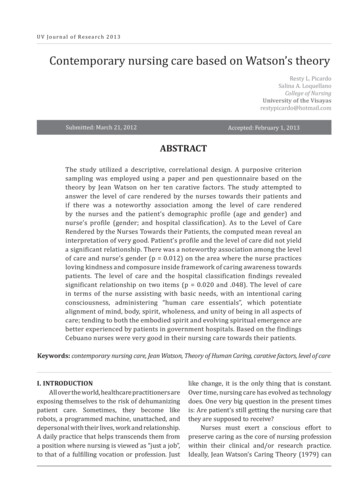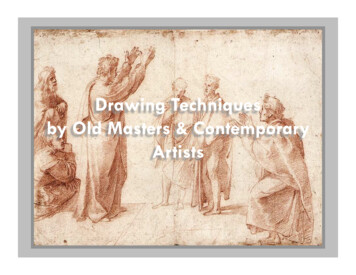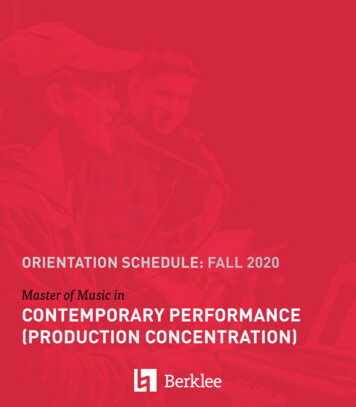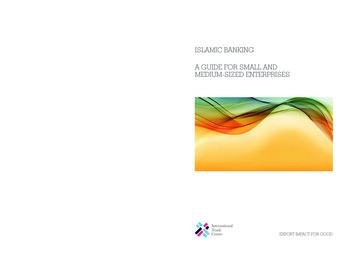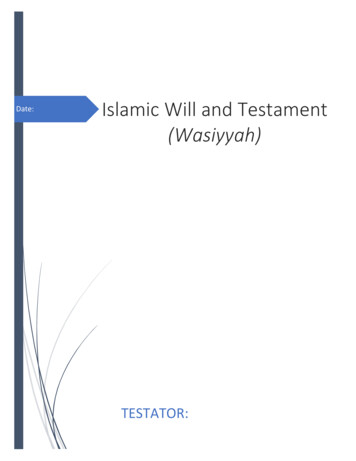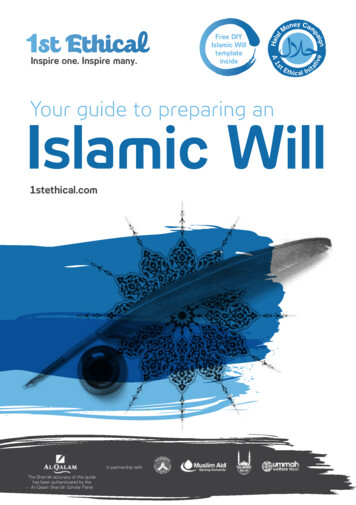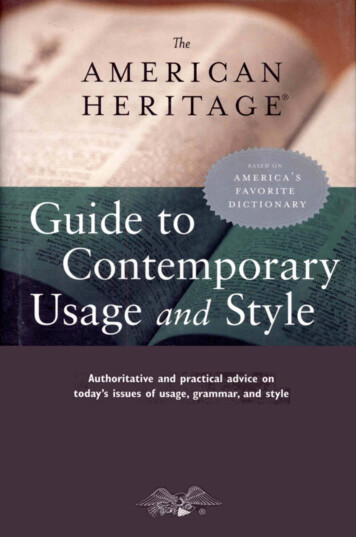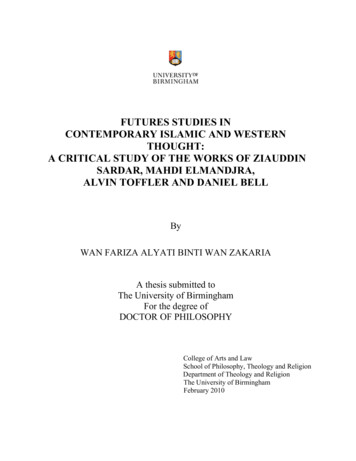
Transcription
FUTURES STUDIES INCONTEMPORARY ISLAMIC AND WESTERNTHOUGHT:A CRITICAL STUDY OF THE WORKS OF ZIAUDDINSARDAR, MAHDI ELMANDJRA,ALVIN TOFFLER AND DANIEL BELLByWAN FARIZA ALYATI BINTI WAN ZAKARIAA thesis submitted toThe University of BirminghamFor the degree ofDOCTOR OF PHILOSOPHYCollege of Arts and LawSchool of Philosophy, Theology and ReligionDepartment of Theology and ReligionThe University of BirminghamFebruary 2010
University of Birmingham Research Archivee-theses repositoryThis unpublished thesis/dissertation is copyright of the author and/or third parties.The intellectual property rights of the author or third parties in respect of this workare as defined by The Copyright Designs and Patents Act 1988 or as modified byany successor legislation.Any use made of information contained in this thesis/dissertation must be inaccordance with that legislation and must be properly acknowledged. Furtherdistribution or reproduction in any format is prohibited without the permission ofthe copyright holder.
DEDICATIONI dedicate this work to,My father, Wan Zakaria Abdul Rahman,My mother, Faudziah Abdullah,My dear sisters and brothers,Wan Nazahiyah, Wan Fakhrul Anwar, Wan Ahmad Zukri, Wan Zuraiha,Wan Farahiyah, Wan Farhana, Wan Zakirah,Wan Mohd. Abdul Hakim, Wan Hakimah Atirah,My beloved grandmothers, Hajjah Wan Kalthum and Hajjah Wan Lijah,My late grandfathers, Haji Abdul Rahman and Haji Abdullah,My late uncle, who inspired me in many ways, Mohd.Shahir Abdullah,And my dear soulmate, for his love and patience.
ACKNOWLEDGEMENTSIn the name of Allah, the Most Gracious, the Most Merciful.Firstly, I would like to thank the National University of Malaysia, whose scholarshipenabled me to perform this research at the first place. My special thanks go to myhonorable supervisor, Dr. Jabal Muhammad Buaben who, without his diligence andpatience in encouraging and stimulating my thoughts, to the extent by lending many ofhis books, this research will not be as it is now. He is indeed ‘a father figure’ who alwayssacrifices his time to help with every single difficulty that I face throughout this journey –thank you very much. May Allah grant him His love and fill his life and family withhappiness. My thanks also go to the University of Birmingham, who generously gave methe opportunity to experience the intellectual journey, and whose staffs of the Departmentof Theology and Religion gave such invaluable help and support. I would also like toconvey my heartiest appreciation to my friends at the Department – Dr.Adlina, Dr.Zuliza, Dr. Hazlin and Sheida Shakouri who encouraged and helped me in the form ofenlightening discussions, as well as enriching life experience.I would like to thank the honorable Professor Dr. Mohamad Nasran, Dean of the Facultyof Islamic Studies, Professor Zakaria Stapa, Former Dean of the Faculty of IslamicStudies, Professor Dr. Mohd Nasir Omar and Professor Dr. Jawiah Dakir, former Head ofthe Department of Theology and Philosophy, and Associate Professor Dr. Ibrahim AbuBakar, current Head of the Department of Theology and Philosophy, Faculty of IslamicStudies and all its members who encourage and help me in every way. My thanks also goto Puan Normah Adam (Registrar’s Office), Puan Zaidah (Bursar’s Office) and PuanKhatijah Sabtu (Department of Theology and Philosophy) for their endless assistance andsupport throughout my study.Most importantly, I owe my gratitude to my beloved parents – Wan Zakaria AbdulRahman and Faudziah Haji Abdullah - for their love and care, their sacrifice andendurance, as well as their unstinting encouragement to pursue my dreams in every singleway – financially, morally and spiritually. Without their prayers and love, this work willii
never become reality. My special love and thanks go to my sisters and brothers, whoalways become my source of strength and happiness – especially to Zuraiha, who hasproof-read this work, and assisted and supported me in every way. To my dear soulmate,thank you very much for your patience and fortitude, sacrifice, caring and love that makethis happens. May Allah grant us His Mercy and Love in this life and the hereafter.Finally, my gratitude and thanks go to my special friends – Mahera Amirrad, Connie Au,Siti Aisyah Abdul Rahman, Jamilah Mohamad, Nur Farhana Abdul Rahman, NorziraSalleh, and Akhzailina Mohd Akhir; my honorable teachers and now become mycolleagues – Associate Professor Ahmad Sunawari Long, Associate Professor Dr. JaffaryAwang, Associate Professor Dr. Mudaser Rosder, Dr.Indriaty Ismail, Dr. AbdullRahman, and Puan Hajah Anisah Zainal Abidin. Last but not least, my special thanks goto Maggie Dennis, who has given me a ‘haven’ during the final stage of my work inAsbury; Asyiqin Abdul Halim and Amani Benhalem, who cheered me up during the finaldays and especially Puan Maziah “Cik Yah” and family – Encik Kassim, Sumayyah,Along, Omel and Anas - whose love and care made me realized the beauty of truefriendship.And all praise is due to the Lord, the Almighty, who gives the breath, the strength – intruth everything – to this humble servant. He indeed, Who taught me and assisted me inthis life journey. Alh amdulillāhi h amdan kathīra!Wan Fariza Alyati Wan ZakariaRoom 3081DepartmentofTheologyPhilosophy,Faculty of Islamic Studies,National University of Malaysia.February 2010.iii&
TRANSLITERATION TABLECONSONANTSVOWELS ء ’Long ا a ﺁ ب b ٷ ت t ٳۑ ث th ٲى ج j ح h Shorts خ kh–َa د d–ِi ذ dh–ُu ر rDouble ێ iyy (final form ī) ۆ uww (final form ū) ز z س s ش shDiphtongs ص s َٲو aw ض d ٲي ay ط t ظ z ع c غ gh ف f ق q ك k ل l م m ن n و w ﻩ h ة h ي y
ABSTRACTFutures Studies, or the study of future, is a post-Enlightenment new field of inquiry inWestern history of intellectual tradition. It attempts to study the probable, possible anddesirable futures for human. Nevertheless, the study and concern on future is not a uniqueWestern phenomenon. Indeed, every society and civilization has its own version of“futures studies”, as found in astrology, numerology, palm reading and so on and soforth. Islam - as the religion of fit rah (primordial nature) - regards future within an eternalconception of time – the dunyā and the akhīrah. With the influence of Western analysison future, this research attempts at firstly recognizing the notion of future in both Islamand Western traditions. In so doing, we chose two Muslim scholars, Ziauddin Sardar andMahdi Elmandjra, who are both prominent in the study of future, and also two Westernscholars, Alvin Toffler and Daniel Bell as representatives of Western tradition instudying future. Secondly, this research traces the development of futures thinking inboth Western and Islamic context and argues that futures thinking, indeed FuturesStudies, has become a significant mode of thinking in Western society within itsreception of modernity, and now postmodernity. The development of Futures Studies andfutures thinking on their Muslim counterpart shows similar interest, though with muchslower pace. Our analysis therefore focuses on the thematical aspects of the scholars’thoughts and compares the divergences between both Muslim and Western views onfuture, as well as their resemblances. We then conclude that the significance of futuresthinking and Futures Studies should be urgently recognized by the Muslims in order toresolve their present condition in which they become part of the contributing factor. This,as we argue and believe, should be realized through an ijtihādic struggle – to be ready tocriticize oneself, and recognize one’s weaknesses and mistakes in understanding andpracticing one’s own religion and then to set forward the best resolution to beimplemented for a desirable future. Only through this process of self-criticism and selfawareness that we can contemplate a self-renewal process for ourselves, and mostimportantly, for the Muslim society and its civilization in the future.i
TABLE OF CONTENTSCHAPTER I INTRODUCTION 11.1The Problem 161.2Rationale .201.3Objectives 221.4Scope and Limitations .231.5Definition of Term – Futures Studies .231.6Literature Review . .241.7Research Methodology. .381.8Chapters Organization .411.9Conclusion .46CHAPTER IIINTRODUCTION TO FUTURES STUDIES IN CONTEMPORARYWESTERN THOUGHT .472.1Introduction .472.2The Concept of Time and Future. .482.3The Rise of Future Consciousness in the West. .522.4Futures Studies – Definitions. .562.5The Historical Development of Futures Studies in the West .622.6The Purposes of Futures Studies and the Futurists .672.7The Methods of Futures Studies .75iii
2.7.1 Global Modelling . .782.7.2 Trend Analysis .812.7.3 The Delphi Technique . .822.8Future Perspectives .842.9Conclusion .89CHAPTER IIIFUTURES STUDIES IN CONTEMPORARY WESTERN THOUGHT:ALVIN TOFFLER AND DANIEL BELL .913.1Introduction .913.2Alvin Toffler: Background and Thoughts .963.2.1Toffler: Life and Works .983.2.2Main Themes in Toffler’s Thoughts .1013.2.2.1 The Theory of Third Wave Society.1013.2.2.2 Knowledge, Change and Technology in the Third WaveSociety. .1093.3Daniel Bell: Background and Thoughts 1183.3.1Bell: Life and Works .1193.3.2Main themes in Bell’s Thoughts 1243.3.2.1 The Theory of The Post-industrial Society. 1243.3.2.2 Knowledge, Change and Technology in the Post IndustrialSociety. .1313.4Discussions.1363.5Conclusion . .150iv
CHAPTER IV FUTURES THINKING FROM AN ISLAMIC PERSPECTIVE . .1554.1Introduction .1554.2The Concept of Time from Islamic Perspective.1564.2.1Time in the Qur’ān . .1574.2.2Time in Classical Islamic Discourse.1664.2.3Time in Modern Islamic Discourse.1704.3Qadar: The Human Destiny in Time.1754.4The Practice Of The Prophets (Peace Be Upon Them) And The S Ah Ābah InImplementing Futures Thinking .1844.5The Emergence of Futures Studies in Contemporary Islamic Thought.1984.6Conclusion . .208CHAPTER V FUTURES STUDIES IN CONTEMPORARY ISLAMIC THOUGHT:ZIAUDDIN SARDAR AND MAHDI ELMANDJRA . 2105.1Introduction .2105.2Ziauddin Sardar: Background and Thoughts . 2125.2.1Sardar: Life and Works . .2125.2.2Main themes in Sardar’s Thoughts .2185.2.2.1 Future’s Idealism: The Reconstruction of Muslim Civilization.2185.2.2.2 Contemporary and Future Challenges: Knowledge, Change andTechnology in the Muslim Society. .2385.3Mahdi Elmandjra: Background and Thoughts 2485.3.1Elmandjra: Life and Works .248v
5.3.2Main themes in Elmandjra’s Thoughts 2515.3.2.1 Future’s Idealism: The Future of Muslim World .2515.3.2.2 Contemporary and Future Challenges: War ofCivilizations. .2605.4Discussions.2635.5Conclusion .284CHAPTER VI A PROPOSAL FOR AN ISLAMIC FUTURICAL INVESTIGATION6.1Introduction . 2956.3Conclusion.304CHAPTER VII SUMMARY AND CONCLUSION .3077.1Summary . .3077.2Suggestions .3077.3Suggestions for Future Research .3137.4Conclusion .314APPENDICESAPPENDIX 1 - The Madīnan Charter 315BIBLIOGRAPHY 320vi
CHAPTER IINTRODUCTIONThe rise of futures concerns in contemporary Islamic Thought is rarely recognizeddespite its significance to the future of Muslim societies in particular and Islamiccivilization in general. Nevertheless, global concern regarding the future is still new inIslamic discussion. Such concern towards Islamic Alternative Futures where Muslimscould achieve brighter futures therefore has become crucial.Contemporary discussion regarding the future of Islamic civilization within themodern framework of Futures Studies 1 – a specific study of future - had been firstlyb
“futures studies”, as found in astrology, numerology, palm reading and so on and so forth. Islam - as the religion of fit rah (primordial nature) - regards future within an eternal conception of time – the dunyā and the akhīrah. With the influence of Western analysis on future, this research attempts at firstly recognizing the notion of future in both Islam and Western traditions. In .

